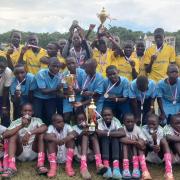
It was World Mental Health Day 2019 on the 10th of October, the focus was on suicide prevention.
Every year close to 800,000 people chose to take their own life. It is all around us. Prince Harry says “People all over the world are really suffering." Ed Sheeran says “It’s time we stood up and said: ‘We’re not going to take this anymore’”. I say “Yes to that!”.
World Mental Health Day is an opportunity to raise awareness of mental health issues and to mobilise efforts in support of mental health.
I became more aware of mental illnesses and disorders during my EPQ (Extended Project Qualification) journey that took me through the life of PTSD and physical and mental scars it leaves on the brain. By conducting an interview with Anthony Gauvain (co-founder of a charity called ‘PTSD resolution’, a retired British soldier and someone who has studied psychology for over 10 years) I was able to delve into the depths of why people struggle with mental disorders such as PTSD and most importantly what we can do to help. He spoke also about the importance of an effective therapist and that finding the right one for you can be a challenge in itself but key in making a successful recovery.
From studying psychology as an A-level and from reading numerous books on well-being and general ‘happiness’ I have learnt a key factor people should understand when dealing with mental health; it is NORMAL to not be ok. We are creatures who have evolved over time, with survival instincts that adapt and change to ensure we continue as a species, and sometimes, as we all know in life, there are mistakes. For example, PTSD put simply is when the body gets ‘stuck’ in a fight-or-flight response state. Our biological components are caught in a loop of ‘fear’. But instead of seeing this as a dead end, you can see it as a mistake and a mistake is always something that can be changed. Your brain is malleable, it’s a muscle just like your hamstring. Therefore you have the ability to change it. If it ‘stuck’ in a state of fear, there is a way of ‘unsticking’ it and the most important thing to do, is to never give up on your brain. It may take a hundred attempts and hours of training but it won’t give up on you unless you give up on it.


























